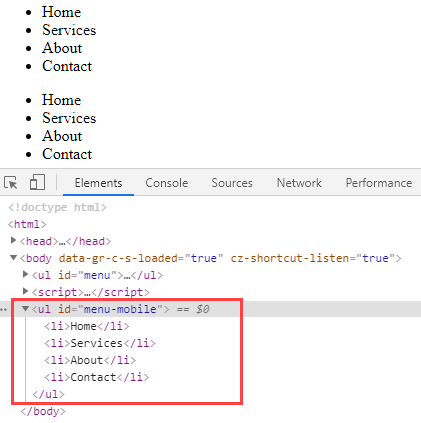Summary: in this tutorial, you will learn how to use the JavaScript cloneNode() method to clone an element.
Introduction to cloneNode() method
The cloneNode() is a method of the Node interface that allows you to clone an element:
let clonedNode = originalNode.cloneNode(deep);Code language: JavaScript (javascript)Pamaraters
deep
The cloneNode() method accepts an optional parameter deep:
- If the
deepistrue, then the original node and all of its descendants are cloned. - If the
deepisfalse, only the original node will be cloned. All the node’s descendants will not be cloned.
The deep parameter defaults to false if you omit it.
originalNode
The originalNode is the element to be cloned.
Return value
The cloneNode() returns a copy of the originalNode.
Usage notes
Besides the DOM structure, the cloneNode() copies all attributes and inline listeners of the original node. However, it doesn’t copy the event listeners added via addEventListener() or assignment to an element’s properties such as originalNode.onclick = eventHandler().
If you clone a node with an id attribute and place the cloned node in the same document, the id will be duplicated. In this case, you need to change the id before adding it to the DOM tree.
JavaScript cloneNode() method example
The following example uses the cloneNode() method to copy the <ul> element and place it in the same document:
<!DOCTYPE html>
<html>
<head>
<meta charset="utf-8">
<title>JavaScript cloneNode() Demo</title>
</head>
<body>
<ul id="menu">
<li>Home</li>
<li>Services</li>
<li>About</li>
<li>Contact</li>
</ul>
<script>
let menu = document.querySelector('#menu');
let clonedMenu = menu.cloneNode(true);
clonedMenu.id = 'menu-mobile';
document.body.appendChild(clonedMenu);
</script>
</body>
</html>
Code language: HTML, XML (xml)How it works.
- First, select the
<ul>with the id menu by using thequerySelector()method. - Second, create a deep clone of the
<ul>element using thecloneNode()method. - Third, change the
idof the cloned element to avoid duplicates. - Finally, append the cloned element to the child nodes of the
document.bodyusing theappendChild()method.
Output:

Summary
- Use the
node.cloneNode()method to clone the node. - Pass
trueinto thecloneNode()method to create a deep clone of a DOM element.